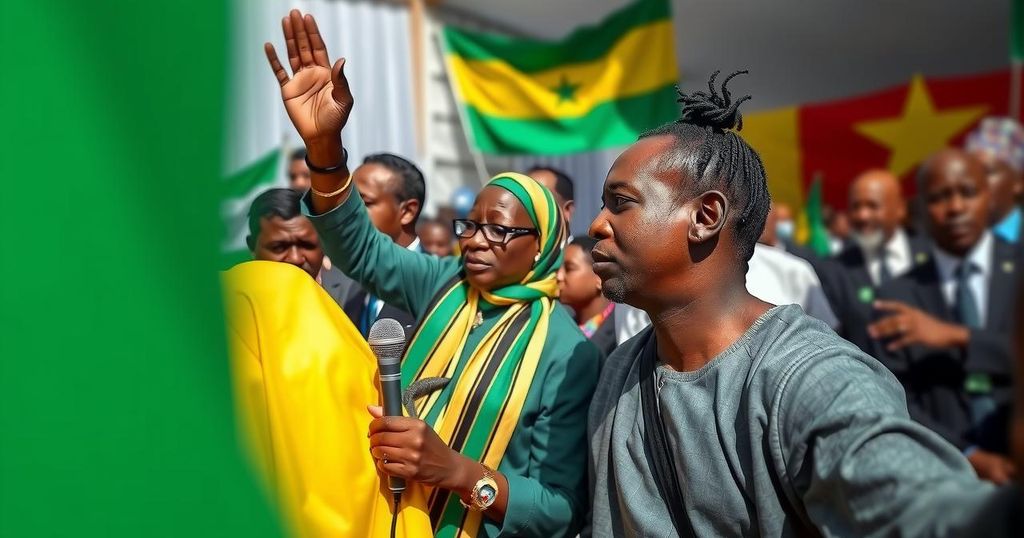Senegal’s Ruling Pastef Party Claims Significant Victory in Legislative Elections
Senegal’s ruling Pastef party asserted a decisive victory in the recent legislative elections, with preliminary results showing a substantial lead over opposition parties. This outcome enables President Bassirou Diomaye Faye’s administration to advance its reform agenda aimed at addressing economic challenges faced by the populace. The elections were characterized by peaceful voting and significant public engagement, highlighting Senegal’s democratic resilience amid regional instability.
Senegal’s ruling party, Pastef, has proclaimed a significant victory in the recent legislative elections, enabling them to pursue an ambitious reform agenda following their rise to power eight months ago. Approximately ninety to ninety-five percent of the votes have already been tallied, showcasing the party’s dominance over the opposition, particularly as President Bassirou Diomaye Faye’s administration looks to implement policies aimed at economic transformation and social equity. The peaceful conduct of voting across regions in Senegal reflects the nation’s historical commitment to democratic processes. Amadou Moustapha Ndieck Sarre, the government spokesman, expressed gratitude to the electorate, stating, “I pay homage to the Senegalese people for the large victory that it has given to Pastef.” This victory comes after a tumultuous initial period in Faye’s presidency, during which he dissolved the parliament due to opposition-led impediments against his reforms, leading to these early elections. Faye’s mentor, Ousmane Sonko, who serves as prime minister, shares a vision for a leftist pan-African agenda that prioritizes addressing unemployment, especially among the youth. First-time voter Mademba Ndiaye emphasized the importance of participating in elections to influence societal change. Despite reports of generally lower voter turnout compared to previous presidential elections, the electorate engaged in the electoral process, demonstrating Senegal’s resilience as a stable democracy in a region often troubled by political upheaval. Sall’s opposition coalition, stationed abroad, alleged electoral fraud but did not present substantiating details, adding to the persistent tensions between the government and opposition factions. Amidst escalating issues such as high unemployment rates and economic difficulties, the Faye administration is undertaking reforms aimed at improving public services and nurturing growth. In light of these developments, Faye and Sonko have championed a platform to restore Senegal’s sovereignty and reevaluate international partnerships in sectors like fishing and hydrocarbon extraction. Such initiatives are critical in an environment where youth unemployment surpasses twenty percent, prompting many to risk perilous journeys to Europe. The resolution of the electoral outcomes and subsequent actions taken by the Pastef government will be closely scrutinized as efforts to implement their development agenda unfold. Meanwhile, analysts suggest that future legislative successes may hinge on maintaining public trust and efficiently addressing the socio-economic challenges facing the nation.
The legislative elections in Senegal represent a critical reflection of the nation’s political landscape, particularly following recent shifts instigated by the rise of the Pastef party. Formed under the leadership of President Bassirou Diomaye Faye, the party emphasizes a reform-oriented platform aimed at tackling pressing national issues like poverty, governance, and youth unemployment. Founded on principles of social justice and transparency, Pastef’s ascent to power is historically significant, especially as Senegal navigates complex political challenges. The results of such elections traditionally impact future parliamentary dynamics and while stability is heralded, unresolved grievances between opposition factions and the ruling government continue to pose potential disruptions.
The recent elections in Senegal have reaffirmed the ruling Pastef party’s command over the legislative agenda, granting it the opportunity to pursue substantial reforms. As the administration seeks to address economic inequities and champion social justice, the conduct of future policies will likely influence the party’s longevity and efficacy in government. The atmosphere of peace during the voting process, along with the engagement of the electorate, points to a continued commitment to democratic principles amidst significant socio-economic challenges. Monitoring how effectively the Pastef party utilizes its legislative victory will be paramount for both public sentiment and the nation’s trajectory.
Original Source: www.france24.com




Post Comment